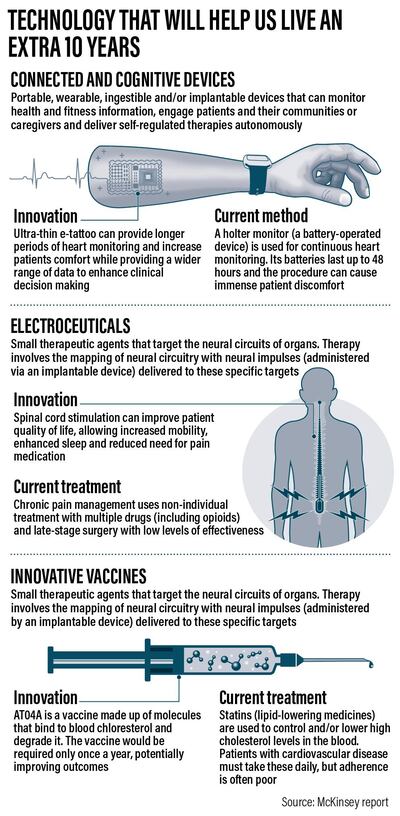The secret to staying younger for longer has been revealed in a new global health report, with science and technology uncovering new ways to live healthier.
The McKinsey Global Institute, an international think tank, compiled an extensive report on healthcare trends and the economic impact of disease and illness.
Adopting long-term healthier lifestyles, utilising existing treatments and embracing new technology by 2040 could make those aged 65 feel more like today’s 55-year-olds, experts said.
The financial impact has huge potential, boosting the global economy by $12 trillion by slashing healthcare costs and increasing productivity.
“Economies around the world have been devastated by the pandemic and its repercussions,” said Jaana Remes, partner at MGI and a lead author on the report.
“Our research lays out a way forward to promote both better health and economic growth at little or no extra cost. Could there be any more important objective right now than making the world both healthier and more prosperous?”
Dr Wael Berro, a family doctor at Mediclinic Parkview Hospital in Dubai, said simple lifestyle changes could extend the lives of many people today.
“Adopting a primary health approach with good eating, exercise and generally a healthy lifestyle has a massive impact on longevity,” he said.
“Life expectancy has already improved by 20 years, even before vaccine development and wider use of antibiotics.
“This report is correct in many areas, but we must also realise the burden of disease will also change as we live longer.”
Analysis was conducted from almost 200 countries, with the Global Burden of Disease data set developed by the Institute for Health Metrics and Evaluation (IHME) at the University of Washington.
A healthy economy requires a healthy population
Clinical guidelines and evidence was extracted from leading institutions including the World Health Organisation, the Disease Control Priorities Network and leading academic journals.
“Despite the progress of the past century, poor health and health inequity continue to limit economic prosperity,” the report’s authors said.
“Premature deaths limit growth by reducing the size of the potential labour force.”
Investment in technology to improve the speed and quality of response to ill health was highlighted as a means to increasing lifespans.
Heart monitoring via ultra-thin e-tattoos, biometric implants to improve sleep and connected wearable devices to monitor vital signs for those living with diabetes are some advances promising to extend life quality.
Comprehensive vaccination programmes are known to be reliable protective measures, as are environmental and agricultural standards to reduce the risk of novel diseases like Covid-19 crossing from animals to humans.
Millions of annual deaths are avoidable
In a typical year, 17 million people die prematurely from a variety of long-term health conditions, many of which are avoidable. But living with chronic conditions also comes at a cost.
“Greater access to fast food has created more problems for society, but people are not dying young from diabetes any more,” said Dr Barro, who has studied healthcare systems in the UAE and Ireland.
“Like other chronic health conditions, diabetes has become easier to control with greater access to advanced healthcare and technology.

“Generally, people are becoming more health aware with greater access to information and data.
“We know that by maintaining weight, regular exercise and by not overeating we are able to live longer.”
An established health insurance system has led to more people visiting their doctor for early screening of chronic illness, leading to better outcomes, Dr Barro said.
Data from the McKinsey report included recent trends arising from the coronavirus pandemic.
Bolstering public health can guard against pandemic threat
Improving global health would bolster the resilience of societies and economies to future pandemics, it said.
People with pre-existing conditions, such as obesity, diabetes and heart disease, have been particularly vulnerable to Covid-19.
Learning from current trends should encourage societies to take specific measures to be better prepared for unpredictable health crises ahead.
“Unfortunately due to the restrictions of movement and use of facilities during the pandemic, people have had changes in their lifestyle,” said Dr Mustafa Saif , an internal medicine specialist at Aster Hospital, Mankhool.
“This has affected them considerably, especially the people with co-existing co-morbidities.
“Their sugar intake, blood pressure and cholesterol started going up, and to add fuel to the fire, if they smoked or increased alcohol use, health problems worsened.
“To make better choices, people must have an insight into their health and the will power to change.”
Researchers at McKinsey suggested preventive health interventions could reduce the global burden of disease by about 40 per cent by 2040, but also increase the planet’s population by an estimated 230 million.
Changes in the workplace and economic policy would allow increased participation of older people in the labour force, driving up gross domestic product but the report also revealed shocking figures on preventable deaths.
About eight million people die annually from preventable or treatable diseases, a third before they are 20.
Avoidable mental health disorders are estimated to now impact a billion people worldwide, including more than 200 million children.
A further 4.5 million die each year from accidental injuries, 80 per cent under the age of 70.
Regular screening was said to be an important development to bring down the numbers dying prematurely from treatable diseases.
Dr Ayesha Khalid, a family medicine consultant at Burjeel Medical Centre, in Abu Dhabi, said some patients had missed vital screening sessions during the pandemic.
“Some have ignored chronic health conditions like thyroid problems, hypertension or high cholesterol level so there was a delay in getting medication and blood tests,” she said.
“Now the pandemic is easing people are coming in but their annual check-ups are delayed.
“It is very important people look after their general health.
“Neglecting it can cause serious problems, impairing their ability to work or live healthily later in life.”














